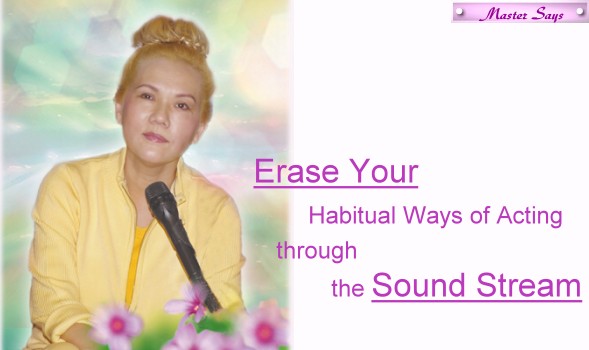
Spoken by Supreme Master Ching Hai, Seven-day Retreat, Yilan, Formosa,
August 12 - 18, 1988 (originally in Chinese) MP3-1
The Mind — A Collection of Habits from Many Lifetimes
You’re always controlled by your mind. You listen to it constantly. Whatever the mind tells you to do, you do it immediately. That’s why, life after life, you haven’t been able to stand on your feet, or become a saint or your own master. Each of us has the Master within. The Master is our wisdom, but we fail to recognize it, for we don’t use it well and are constantly deceived by our minds. In fact, the mind is just a tool that can’t distinguish between good and bad but simply reacts out of habit.Suppose you’ve enjoyed eating rice since childhood. The mind knows this and says, “Ah! I’ve been eating rice every day of my life. So I should always eat rice.” It thinks in this way so if later you go to America, where rice is not readily available and you can only have bread every day, you feel uneasy. This is not a reaction of the Self. It’s the mind telling you, “It’s awful to eat bread every day. I must have some rice today!” Most Chinese travelers make it a point to have rice at all three daily meals, for they can’t endure a regular diet of bread and potatoes. Like us, the American people have eyes, ears, noses and tongues, yet they have no problem eating bread and potatoes every day. However, if you ask them to eat rice each day, they can’t bear it either. So we know it’s a problem caused by our minds and customs.
What is the mind? The mind is nothing but a piece of equipment that’s similar to a recorder. Whatever you record, it plays back to you when you push a button. Thus, we should absolutely not listen to this instrument. For people controlled by their habits, life is boring because they do routine work all day. These habitual patterns comprise our minds, yet we mistake them and our minds for our Self, making it impossible for us to recognize our true Self.
Whether we’re American, Chinese, French or of any other nationality, our true Self is the same. The primal Self that existed before we developed the practice of eating rice or potatoes, or of drinking beer, is the true Self. Later we change into another person after following certain behavioral routines and customs. We believe that we’re the ones who like eating rice or potatoes, or drinking beer, but actually that’s not our Self. This person is created under the influence of customs and patterns, by our desires in life, by bodily needs; it’s not the true Self.Spiritual practitioners are best advised to listen to the inner Master rather than to their habits or minds. The more we listen to the mind, the more we fall under its spell and can’t break free of it. If we aren’t cautious, our whole life will become very boring; much like that of a stone. We’ll live each day in the same way, with the same thinking, same customs and same actions, but without the least bit of wisdom.
If we wish to attain wisdom, we must make use of it practically. For example, if we don’t use the money in our possession, can it benefit us in any way? We may have lots of money, but if we save it all in a bank or store it in a corner, but work hard each day, using only what we earn and leaving all our other money stored in the bank or a corner, it becomes useless, and one day it will just rot!By this same theory, if we fail to quickly recognize our independent Self and its freedom from reliance on anything, we’ll fall under the control of our wonts. Our attention and energy will become focused on long-established behavior patterns. Such attention, given its great power, will form a mold once it integrates itself with many of these patterns. For example, this mold might have a preference for rice, women, alcohol and tobacco. All of these tendencies will then combine to form a certain blueprint, and the next time we transmigrate, we’ll act in more or less the same way and add in more new behaviors.
Suppose a person had certain ways of acting in his previous life and also in this lifetime; though he’s born in a different place, he still retains his previous-life patterns and also develops several new ones to make the situation even more complicated. So there are times when we don’t know what kind of person we are. We’re happy today but unhappy tomorrow; we’re OK today, but awful tomorrow; today we speak like Asians, and tomorrow we speak like Westerners. We can’t be independent or be our own master. We can’t decide for ourselves, all because we’re controlled by our habitual behaviors. The mind is nothing but a collection of these patterns. So in order to change ourselves, we must first change our traditional ways of acting.The truth is, the individual does not exist in the first place. We come from the same power, which makes use of certain tools to gain experience and learn lessons. However, we assume that these lessons are our Selves and confine our great energy within a mold, thus limiting ourselves and placing our true Self under the control of habitual patterns, which may dictate to our almighty power when it’s time to eat rice or smoke tobacco. This power doesn’t need to do such things, but does them only because it’s under the mind’s control.